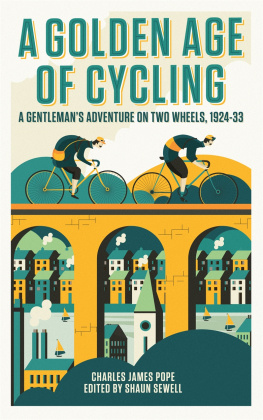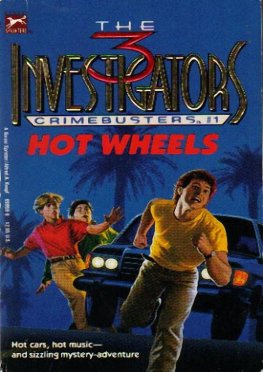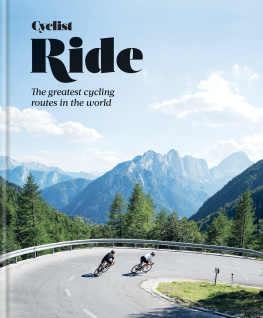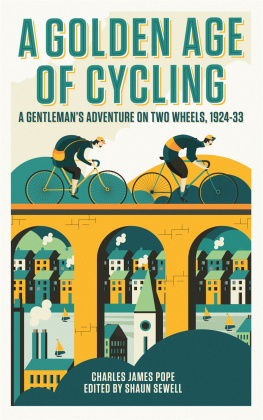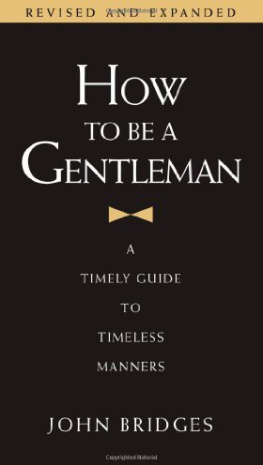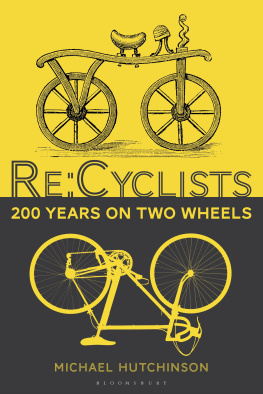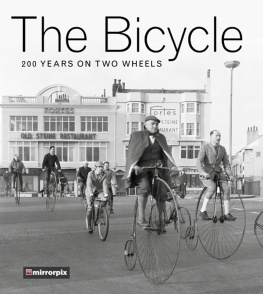Contents
Pagebreaks of the print version
A GOLDEN AGE OF CYCLING
A GOLDEN AGE OF CYCLING
A GENTLEMANS ADVENTURE ON TWO WHEELS, 1924-33
CHARLES JAMES POPE
EDITED BY SHAUN SEWELL

Published by 535
An imprint of Blink Publishing
3.08, The Plaza,
535 Kings Road,
Chelsea Harbour,
London, SW10 0SZ
www.blinkpublishing.co.uk
facebook.com/blinkpublishing
twitter.com/blinkpublishing
Hardback 978-1-911-27430-8
Ebook 978-1-911-27431-5
All rights reserved. No part of the publication may be reproduced, stored in a retrieval system, transmitted or circulated in any form or by any means, electronic, mechanical, photocopying, recording or otherwise, without prior permission in writing of the publisher.
A CIP catalogue of this book is available from the British Library.
Typeset by Envy Design
Copyright Michael James Pope, 2018, under licence to Shaun Sewell
The right of Charles James Pope to be identified as the author of this Work has been asserted by the Proprietor in accordance with the Copyright, Designs & Patents Act 1988
Every reasonable effort has been made to trace copyright holders of material reproduced in this book, but if any have been inadvertently overlooked the publishers would be glad to hear from them.
Blink Publishing is an imprint of the Bonnier Publishing Group
www.bonnierpublishing.co.uk

CONTENTS

THE GOLDEN AGE OF CYCLING THATS RIGHT NOW, ISNT IT?
Cycling has certainly experienced a striking renaissance at all levels of riding in the last two decades. The unprecedented success at the Olympics and World Championships, and dominance of the Tour de France, has catapulted cycling to new heights of popularity and made household names of the cycling superstars of Hoy, Wiggins, Froome, Trott, Kenny and Boardman. Who would have thought 20 years ago that a cyclist would have the same marketing status as a Premier League footballer and would lift the coveted BBC Sports Personality award three times in the last decade?
This success has filtered down to all levels from the resurgent home Tours and an increase in amateur club cycling to a huge upturn in leisure and commuters cycling for the pure exhilaration of being on the open road or track. According to a British Cycling report over two million Britons cycle every week, a level never seen before. The Tour of Britain has really captured the imagination of the public who have given enormous support to a Tour which previously had been and gone through towns without much of a fuss. The Tour of Britain finishing in my home town of Blyth in Northumberland was the highlight of the year and brought the town to a standstill.
The only downside to modern day urban cycling in Britain is the perceived danger of cycling with the high level of motorised road users. Cycle paths have certainly helped but theres nothing like taking to the open road and cycling along the highways and byways of this beautiful nation. This was the utopia that Charles James Pope experienced in the years after the First World War to the middle of the 1930s. The perfect storm of more leisure time due to changes in the working week, improved and more reliable bicycles and an upsurge in the popularity of exploring the country alone or in a club creating the first golden age of cycling.
Charles returned from his service during World War One and fell in love with the ability to leave the stress of the working week in London behind and head out to adventures and exploration of the unspoilt beautiful towns and villages of rural England. The simple pleasure of cycling on a three gear bike with a Bartholomew map and the latest copy of the Cycling Tourist Club handbook to hand was all Charles needed to be happy and content. Charles love of cycling was shared by the masses and the popularity of being part of the emerging cycling clubs made cycling the recreational craze of the time.
There was something quaint and romantic about the freedom of cycling from village to village only interrupted by a beer and a feed at a country pub at a pace you could appreciate the rustic rural life. The only horsepower Charles usually came across was the loyal Shire ploughing the fields or pulling the carts along the country lanes. However, the increased pace of life and advancement is never far behind and Charles knew this life was changing with the advent of the increasing numbers of motor cars and the apparatus and support network the combustion engine needed.
Charles, throughout his diaries, made no secret that he greatly disliked the motor car and usually those who drove these vehicles. The need for new roads, stronger bridges, petrol stations was changing the land Charles knew so well and that it would change his cycling paradise forever. Looking back Charles was fortunate that he was the last generation of cyclists who could cycle without the noise and pollution the combustion engine brought upon the land. The freedom that cycling gave the working classes was soon to be taken over by the popularity of car ownership.
This interwar period was definitely the first golden age of cycling and Charles certainly made the most of it. Not only was it his route to freedom but it became his social life and would eventually be the catalyst to leave his bachelor days behind and married his beloved Doris.
I am grateful that I managed to find Charles diaries and photographic albums at an auction a few years ago and began the journey getting to know the man through his cycling tours of England and Wales in the 1920s and 1930s. I think anyone who has cycled will appreciate his writing and observations of life on two wheels. I am fortunate enough to live in an outstanding area of countryside and have cycled many thousands of miles through Northumberland on, at times, quiet and peaceful country lanes watching the change of seasons and vistas from my Raleigh Pioneer saddle. Although we are many years apart, I feel a certain kinship with Charles, and I hope after reading Charles accounts of his cycling adventures you will too.
Shaun Sewell
Northumberland
April 2018

CHARLES JAMES POPE
Charles was born on 11th March 1879 in Bridge Road, Hammersmith, London. The Popes of Hammersmith were synonymous with the furniture and auction business for generations until the late 1960s. Charles father, also named Charles James Pope, was a furniture warehouseman who sadly died in 1881 when Charles was only two years old.
It seemed that Charles spent most of his working career as a solicitors clerk. His mother, Harriet, is recorded in the 1911 Census as living by her own means and his brother Edward Brownfields occupation is listed as a clerk.
Charles enlisted in the First World War and served in the 5th London Rifles. During the summer of 1916 he trained at the Fovant Camp in Wiltshire. Prior to leaving for France, the Rifles carved their regimental badge into the chalk hillside. Other regiments followed the example of the London Rifles and carved their badges alongside. The hillside became a monument to those whose lives were lost in the Great War.

